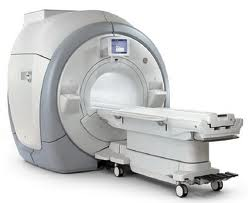Magnetic Resonance Imaging (MRI)
 Thanks to cutting-edge technologies, we have advanced the capabilities of MR imaging here at HCRMC by acquiring a new MR scanner. It’s capable of delivering both uncompromised image quality and patient comfort all while giving physicians the diagnosis for your treatment.
Thanks to cutting-edge technologies, we have advanced the capabilities of MR imaging here at HCRMC by acquiring a new MR scanner. It’s capable of delivering both uncompromised image quality and patient comfort all while giving physicians the diagnosis for your treatment.
The MRI staff at Hyper Care Regional Medical Cente use a state-of-the-art GE 1.5 Tesla Short Bore imaging unit measuring approximately 4 feet in length, which offers some relief to claustrophobic patients while providing high quality images.
Before the MRI procedure, you will be asked to fill out a screening form asking about anything that might create a health risk or interfere with imaging. You will also undergo an interview by a member of the MRI department to ensure that you understand the questions on the form. Even if you have undergone an MRI procedure before at this or another facility, you will still be asked to complete an MRI screening form.
In some unusual cases the examination may be canceled because of concern related to a particular implant or device. For example, if an MRI is ordered, it may be cancelled if the patient has a ferromagnetic aneurysm clip because of the risk dislodging the clip from the blood vessel. Also, the magnetic field of the scanner can cause a heart pacemaker to malfunction. If you have a bullet or other metallic fragment in your body there is a potential risk that it could change position, possibly causing injury.
Examples of items or things that may create a health hazard or other problem during an MRI exam include:
- Pacemaker
- Implantable cardioverter defibrillator (ICD)
- Neurostimulator
- Aneurysm clip
- Metal implant
- Implanted drug infusion device
- Foreign metal objects, especially if in or near the eye
- Shrapnel or bullet wounds
- Permanent cosmetics or tattoos
- Dentures/teeth with magnetic keepers
Please note: This information is provided for the sole purpose of educating you as to the basics of the MRI examination. You should rely on you physician, radiologist, or MRI technologist for specific information about you own examination.
What is MRI?
MRI, or magnetic resonance imaging, is a means of "seeing" inside the body in order for doctors to find certain diseases or abnormal conditions. MRI does not rely on the type of radiation (i.e., ionizing radiation) used for an x-ray or computed tomography (CT) scan. The MRI examination requires specialized equipment that uses a powerful, constant magnetic field, rapidly changing local magnetic fields, radiofrequency energy, and dedicated equipment including a powerful computer to create very clear pictures of internal body structures.
During the MRI examination, the patient is placed within the MR system or "scanner." The powerful, constant magnetic field aligns a tiny fraction of subatomic particles called protons that are present in most of the body's tissues. Radiofrequency energy is applied to cause these protons to produce signals that are picked by a receiver within the scanner. The signals are specially characterized using the rapidly changing, local magnetic field and computer-processed to produce images of the body part of interest.
What is MRI used for?
MRI has become the preferred procedure for diagnosing a large number of potential problems in many different parts of the body. In general, MRI creates pictures that can show differences between healthy and unhealthy tissue. Doctors use MRI to examine the brain, spine, joints (e.g., knee, shoulder, wrist, and ankle), abdomen, pelvic region, breast, blood vessels, heart and other body parts.
How safe is MRI?
To date, over 150 million patients have had MRI examinations. Every year, approximately 10 million patients undergo MRI procedures. MRI has been shown to be extremely safe as long as proper safety precautions are taken. In general, the MRI procedure produces no pain and causes no known short-term or long-term tissue damage of any kind.
